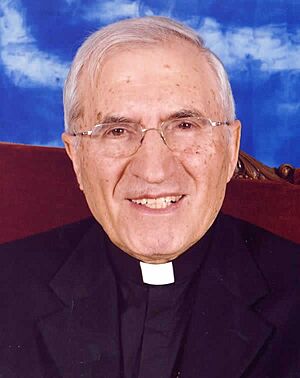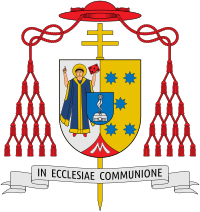Antonio María Rouco Varela facts for kids
Quick facts for kids His Eminence Antonio Rouco Varela |
|
|---|---|
| Cardinal, Archbishop emeritus of Madrid | |

Antonio María Rouco Varela
|
|
| Archdiocese | Madrid |
| Appointed | 28 July 1994 |
| Reign ended | 28 August 2014 |
| Predecessor | Angel Suquía Goicoechea |
| Successor | Carlos Osoro Sierra |
| Other posts | Cardinal-Priest of San Lorenzo in Damaso President of the Spanish Episcopal Conference |
| Orders | |
| Ordination | 28 March 1959 |
| Consecration | 31 October 1976 by Maximino Romero de Lema |
| Created Cardinal | 21 February 1998 |
| Rank | Cardinal Priest |
| Personal details | |
| Birth name | Antonio María Rouco Varela |
| Born | 20 August 1936 Vilalba, Spain |
| Nationality | Spanish |
| Denomination | Roman Catholicism |
| Parents |
|
| Previous post |
|
| Motto | In ecclesiae communione |
| Coat of arms |  |
| Styles of Antonio Rouco Varela |
|
|---|---|
 |
|
| Reference style | His Eminence |
| Spoken style | Your Eminence |
| Informal style | Cardinal |
| See | Madrid |
Antonio María Rouco Varela (born August 20, 1936) is a Spanish Catholic leader. He served as the Archbishop of Madrid from 1994 to 2014. He became a cardinal in 1998. Cardinal Rouco Varela was also the president of the Episcopal Conference of Spain for several years.
Contents
A Look at His Life
Antonio Rouco Varela was born in Vilalba, Spain. His parents were Vicente Rouco and María Eugenia Varela. He has four siblings. He studied at the seminary in Mondoñedo and at the Pontifical University of Salamanca. He became a priest on March 28, 1959.
He continued his studies at the University of Munich. There, he earned a special degree in church law in 1964. He taught at the seminary of Mondoñedo and the University of Munich. In 1976, he became a bishop for the Archdiocese of Santiago de Compostela.
Becoming an Archbishop
In 1984, Pope John Paul II named him the Archbishop of Santiago de Compostela. He helped organize the 4th World Youth Day in 1989. This is a big event where young people from all over the world gather. Five years later, in 1994, he became the Archbishop of Madrid.
Important Events in Madrid
While leading the Archdiocese of Madrid, Cardinal Rouco Varela took part in many important events for the Spanish royal family. He officiated at the wedding of Prince Felipe and Letizia Ortiz. He also baptized their daughters, Leonor, Princess of Asturias, and Sofia.
Becoming a Cardinal
Pope John Paul II made him a cardinal on February 21, 1998. As a cardinal, he was one of the church leaders who voted for a new Pope. He participated in the 2005 papal conclave that chose Pope Benedict XVI. In 2011, Pope Benedict XVI visited Madrid for World Youth Day 2011. Cardinal Rouco Varela was the Archbishop of Madrid at that time. He also voted in the 2013 papal conclave that elected Pope Francis.
On August 28, 2014, he was replaced as Archbishop of Madrid by Carlos Osoro Sierra. This happened because cardinals usually retire from their main duties when they turn 75.
His Beliefs and Ideas
Supporting Family Values
Cardinal Rouco Varela is a strong supporter of the Neocatechumenal Way. This is a movement within the Catholic Church. He helped organize large events called 'family days' in 2007 and 2008. These events promoted the traditional Catholic family model.
He also led efforts to support traditional views on family and life in Spain.
Church Art and Design
During his time as Cardinal Archbishop of Madrid, he oversaw the decoration of the Almudena Cathedral. This church was decorated with paintings by Kiko Argüello and mosaics by Father Marko Ivan Rupnik.
Connecting with Young People
Cardinal Rouco Varela wanted young people to know that Jesus Christ loves them. He invited them to have a "profound, authentic and joyful encounter with Jesus Christ." He believed that Jesus could offer them truth, hope, and love, and show them the way to true happiness. He wrote about this before World Youth Day in 2011.
See also
 In Spanish: Antonio María Rouco Varela para niños
In Spanish: Antonio María Rouco Varela para niños

